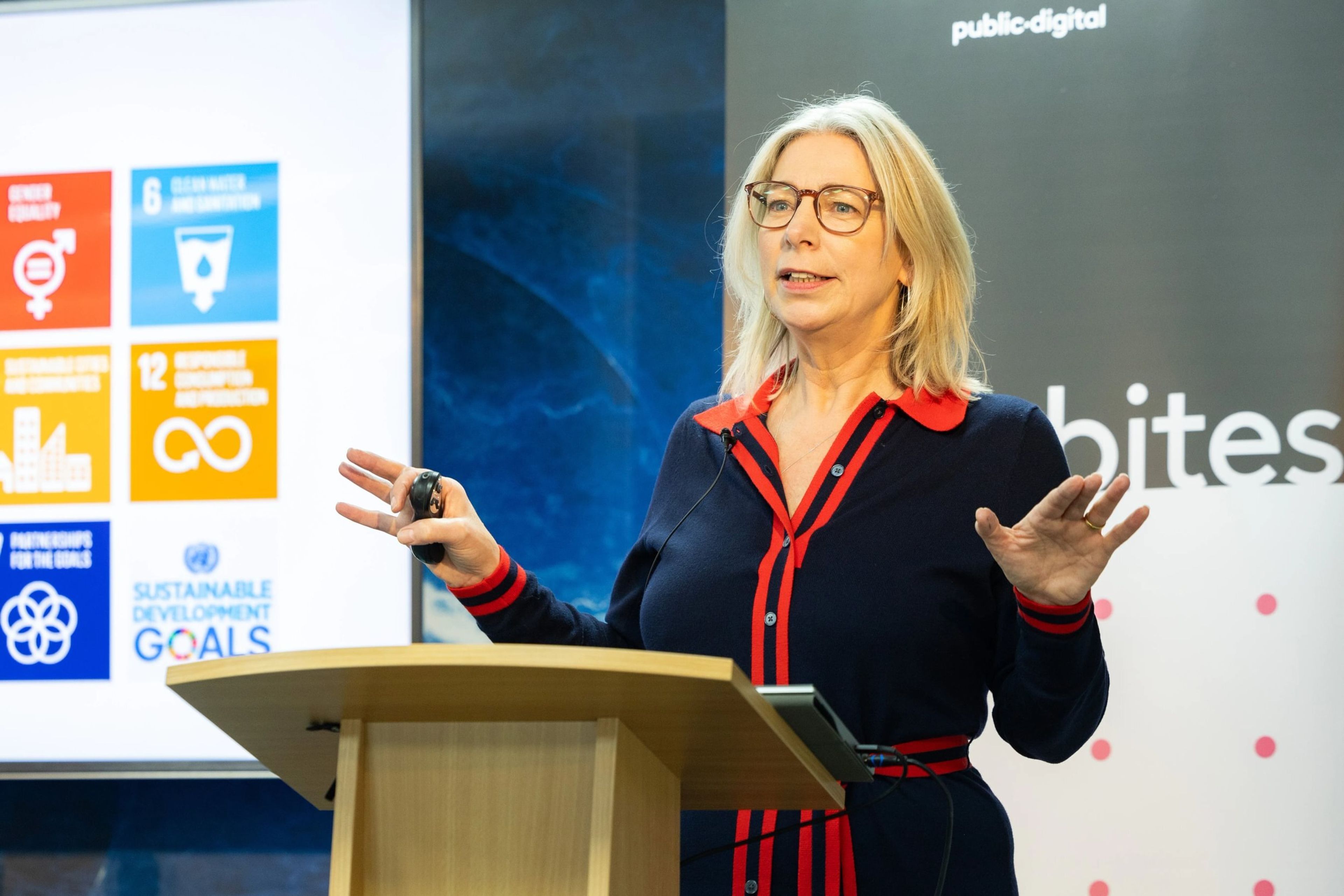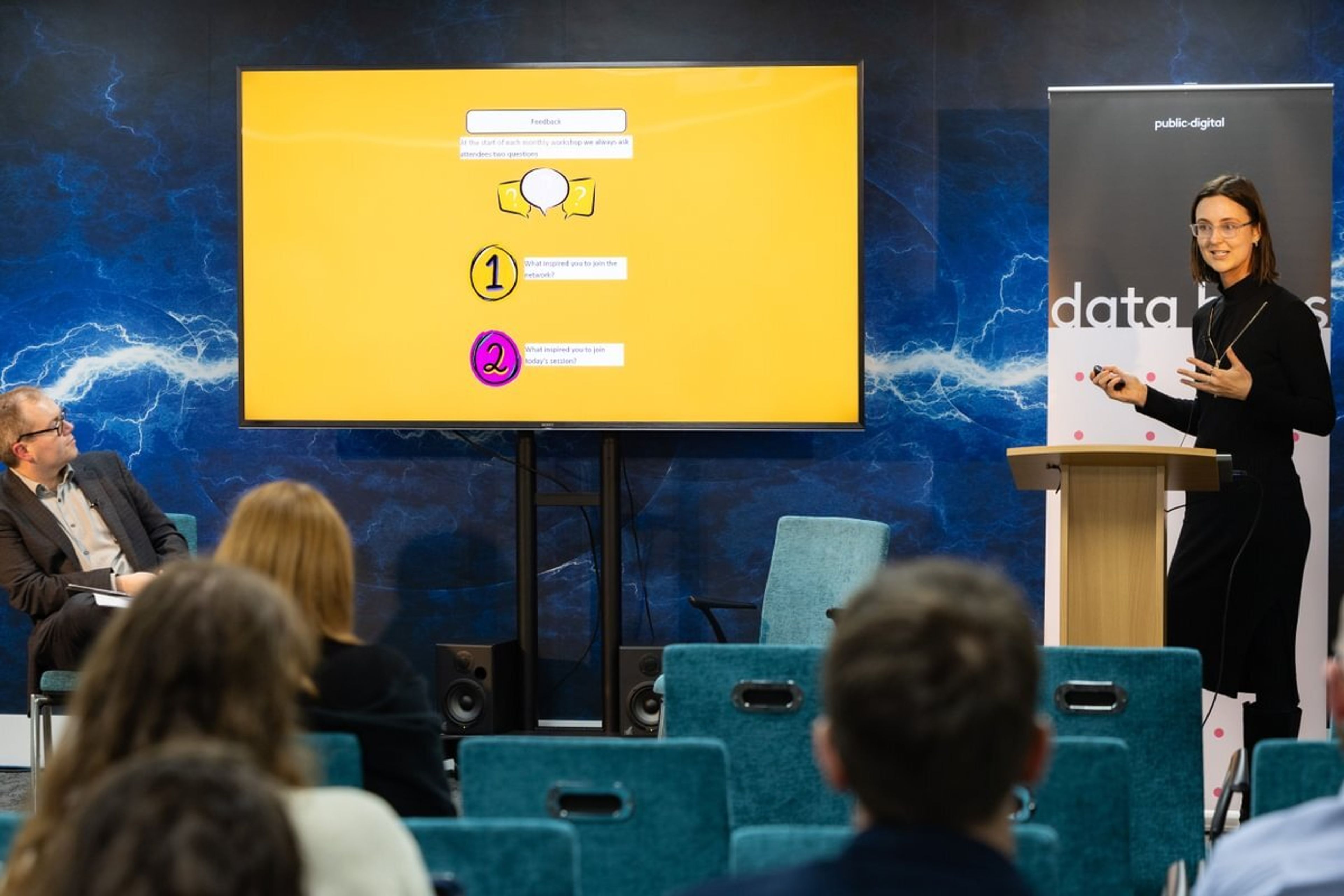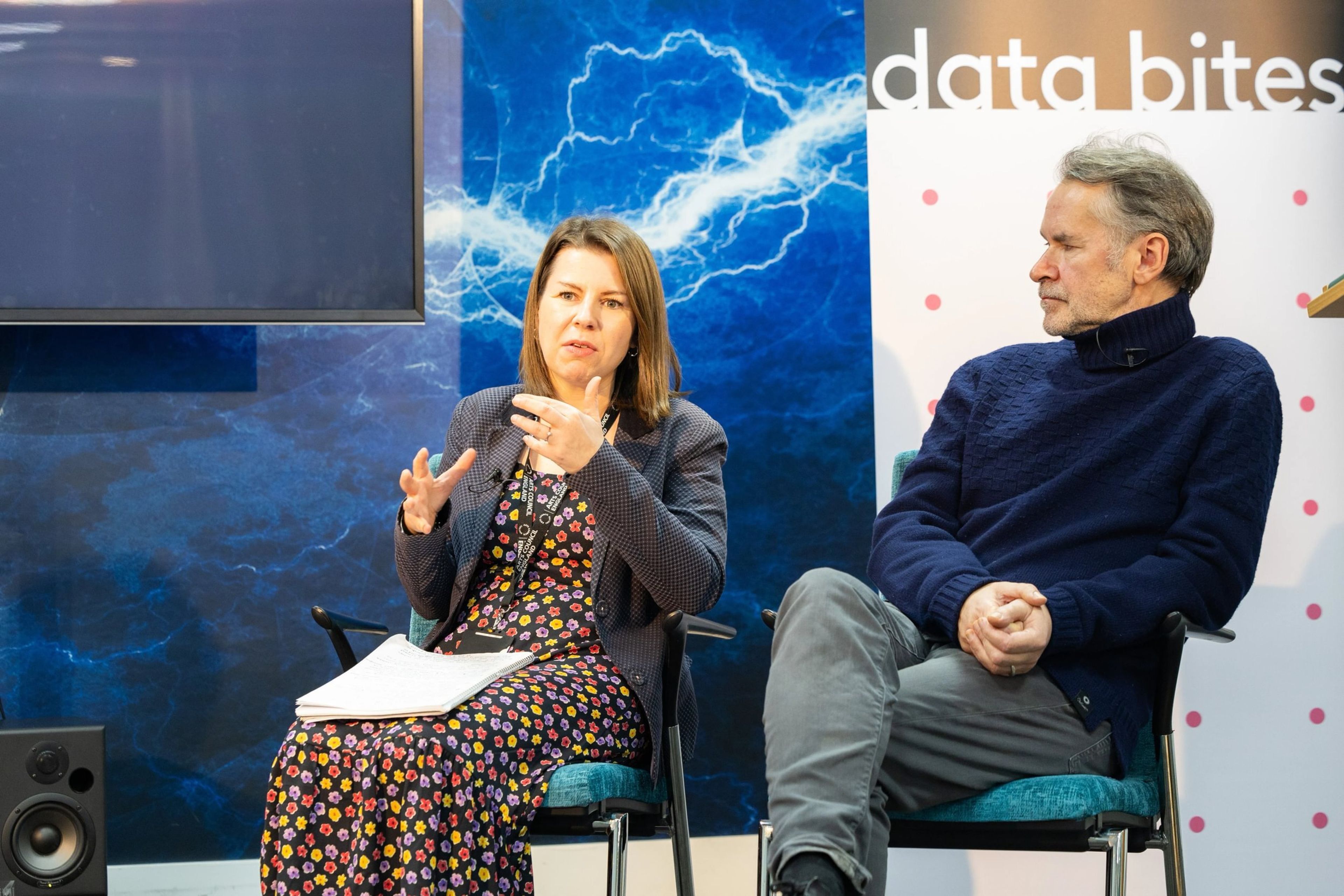Data Bites #51
Our 51st Data Bites - the second at Public Digital following its move from the Institute for Government - was the last of the year, and the last before Christmas. To mark the occasion, I did some very serious data analysis to prove that it’s not just you - Christmas is indeed getting earlier.
But that was a mere stocking filler for the main gifts - four more fantastic presentations with different perspectives on data. You can watch the episode below or listen to it on SoundCloud.
Data Bites is a monthly meet-up designed to showcase interesting data projects in and around the public sector. Four brilliant speakers each get eight minutes to present – there are eight bits in a byte, hence eight minutes in a Data Bite – followed by eight minutes of Q&A.

Sian Basker on data maturity
Our first speaker was Sian, Co Chief Executive of Data Orchard, who presented on ‘Data Maturity, are we there yet? A comparison of sectors and their progress’. This drew from Data Orchard’s latest annual ‘State of the Sector’ report.
See Sian's slides and highlights from her presentation here.

Anna Trichkine on developing a data practitioners network
Anna, data quality lead at the London Borough of Hounslow, shared her experience of developing a data practitioners network and the benefits they can bring to local authorities. Her slides finish with some really useful resources, and she is hoping to turn the work into a short ebook soon.
We also ask our speakers – if they have time! – to answer a standard set of questions. Here are Anna’s answers:
Can you summarise your project in a few sentences? Data is a service. Not a Dashboard. Setting up a Data Practitioners Network is the solution to transforming the ways in which public sector organisations can operate more effectively by enabling in-house expertise.
What problem are you trying to solve? If Data is a Service, how can we support each public sector organisation to service all its multiple and complex business streams? A Data Practitioners Network might be the solution.
What difference will it make to citizens? All Data Are Local. Understanding our local data is the start to working out how best we can service our residents.
How will you know when it’s succeeded? More inclusive and participatory data practices, with impact measurement informed and curated by residents themselves!
What are the main hurdles? Embedding the community of practice into job descriptions, and as part of the Data Culture within the organisation.
If you could change one thing about data in government, what would it be? I would start with the premise that Data is a Service, and we all exist in data cultures. With this in mind, is the data service offered by existing approaches in government offering a user experience that is aligned to the needs of the users?
See Anna's slides and highlights from her presentation here.

Adam Evans on UK-wide data coherence
Adam - the first virtual speaker since Data Bites moved to Public Digital - is the Lead for UK-wide Data Coherence at the Office for National Statistics. Unsurprisingly, his presentation was all the coherence of UK-wide data - what it is, why it matters, and how we can improve it.
Here are Adam’s answers to our questions:
Can you summarise your project in a few sentences? Statistical coherence is about bringing together statistics on the same topic to better explain the part of the world they describe. This can be across the four countries of the UK where policy making has been devolved (such as in housing or health) or where multiple producers are publishing statistics on the same topic (such as income and earnings).
The UK-wide data coherence project at the ONS specifically focusses on promoting and improving the coherence and comparability of cross-UK statistics (data collection, processing, methodology and outputs) in areas of priority interest to the devolved governments. Approaches we use include:
- Supporting the production of data and analysis including UK-wide comparisons where it is possible to make them
- Supporting the development and the production of statistics to include considerations of comparability, including across the UK, at the outset
- Providing clear explanations of how data can, or cannot be, compared to facilitate the correct interpretation of statistics, and maximise the value of statistics produced on the same theme
What problem are you trying to solve? Where policy areas are devolved across the UK nations, the associated statistics are often not comparable, for example in health and housing. In other areas also, there can be differences in the way data is collected or the availability of data which means statistics produced on the same topic are not comparable.
We are aiming to improve the comparability of statistics in priority areas of interest across the four nations, where possible. Having comparable data across the four nations means the effect and impact of different policies can be better measured and compared. This is not always feasible or practical however, and in these situations we also try and provide clear explanations for users of how data can or cannot be meaningfully compared so they can make informed decisions about using interpreting the data.
What difference will it make to citizens? Being able to compare and contrast different policies implemented in the 4 nations gives policy makers better quality information which they can use to evaluate how to improve services for citizens across the whole of the UK. Bringing datasets together and explaining the bigger picture and highlighting where data cannot be compared also prevents misinterpretation of data and drawing the wrong conclusions.
How will you know when it’s succeeded? I don’t think this work will ever be complete, there will always be more to be done and data will always evolve. However we have a solid process for measuring continuous improvement. For each financial year we identify what the UK-wide coherence priorities are for users and then monitor progress in relevant projects and check that objectives are being met. There are many different ways to improve coherence and so success in this field is about identifying the most suitable actions for each project and implementing it effectively.
What are the main hurdles? The main hurdles are:
- Historically data collection for devolved policies have only been designed with monitoring the policy in mind and this created many UK-wide coherence issues. A lot of work is now being done to improve UK-wide coherence where possible and going forward teams are encouraged to adopt a UK-wide first approach when designing new data collection methods
- Structural coherence- In order to produce coherent outputs, we need to improve alignment of infrastructure and processes. For example, we need data platforms aligned to make it possible to share data
- The increasing use of administrative data brings in more high quality data, however it is not designed for statistical purposes. This means there will be natural barriers to what can be achieved for improving coherence with regards to administrative data
- There are limitations on resource and skills available so we prioritise what is most important to users
If you could change one thing about data in government, what would it be? From a UK-wide coherence perspective it would be any new data collections and datasets should be developed on a UK wide basis by default where possible.
See Adam's slides and highlights from his presentation here.

Ria Jones and Jason Jones-Hall on the Arts Council’s new Data and Place Explorer
Ria (Senior Project Manager, Place at Arts Council England) and Jason (Director of Development, Five10Twelve) talked about the Culture and Place Data Explorer they have built, and how they approached the project together.
Here are Ria and Jason’s answers to our questions:
Can you summarise your project in a few sentences? Arts Council England has launched the Culture and Place Data Explorer (the Explorer) an interactive tool that allows users to map investment in culture and creativity with over 200 other data indicators that tell us more about people and places across the country.
The Explorer allows users to:
build a profile of the cultural and creative infrastructure in a specific area, with over 200 data indicators, all in one place
instantly compare data in a specific area with data from other towns, or cities, or regional and national statistics
produce and download customisable and detailed reports, charts and tables
What problem are you trying to solve? Arts Council England has designed the Explorer to provide users with a detailed hyper-local picture of where our funding is reaching, and where there are opportunities to improve access and engagement and where or for what local need - beyond cultural provision - this funding should be targeted. The aim is for this to encourage a data-enabled and evidence-based approach to cultural development across the country, with multiple public data sources within the Explorer easily accessible.
What difference will it make to citizens? The wealth of data provided by the Explorer will provide access to vital information to allow citizens to understand both where Arts Council England funding is currently allocated, and where engagement could be improved. The tool will also provide easy-to-access details of the demographics, challenges and opportunities facing local communities.
How will you know when it’s succeeded? Increased use of data and evidence within cultural planning, directly using the Explorer as the source. This has the potential to lead to more in depth development of cultural strategies, to further support policy development and increase place based cultural development, in turn directly benefitting local communities.
What are the main hurdles? Ensuring the data within the Explorer is managed, maintained and remains agile. The product will need to remain flexible and as policy and the funding landscape changes the Explorer will need to be updated in a timely manner, so it stays relevant. There are also multiple data products available, or in development, to support cultural planning so ensuring the Explorer remains visible is also very important.
If you could change one thing about data in government, what would it be? More national data to be made publicly available at smaller geographies - Local Authority level as a minimum, ideally down to LSOA level. National data and statistics are great for building up the bigger picture, but this does not help support localised place-based strategies, policies or funding initiatives that seek to address regional and local inequalities.
See Ria & Jason's slides and highlights from their presentation here.
If you’d like to present at a future Data Bites, or would like to recommend someone, please get in touch!
Photos by Paul Clarke.